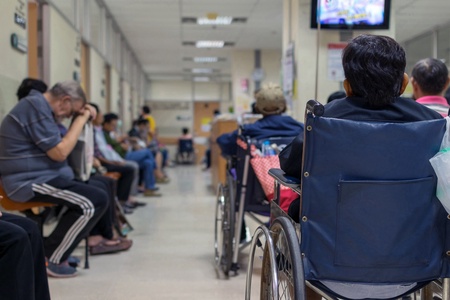According to new research from the University of Aberdeen if surgical rates do not increase in Scotland, orthopaedic patients listed in July 2022 will have up to a seven year wait in one health board area, with the average wait across all Scottish health boards climbing to more than two years and three months.
The study, published in the Bone and Joint Research journal predicts the average waiting time for orthopaedic surgery in Scottish regions according to current and forecasted factors.
Luke Farrow, Clinical Research Fellow at the University of Aberdeen worked alongside clinical and academic colleagues across Scotland to calculate the predicted waiting times for surgery, determine the mismatch between current supply and demand, and assess the feasibility of the Scottish Government target of one year wait time by 2024.
The team calculated four possible different scenarios, ranging from “worst-case scenario”, where activity remains at current levels for the foreseeable future, to “best-case scenario” where activity returns to pre-pandemic volumes by November 2022 bolstered by proposed additional National Treatment Centre capacity.
According to the calculations there would be significant variation in national service provision in the worst-case scenario, with an almost six-year difference in potential waits between the health boards with the longest and shortest projected times to surgery.
Since the cessation of routine surgical activity during the pandemic, a substantial backlog of patients waiting for orthopaedic surgery has accumulated. Evidence shows such delays are associated with negative short and long-term consequences in the health and wellbeing of patients.
Using publicly available data from Public Health Scotland, the team calculated predicted waiting times for all 14 health boards in Scotland, including Scotland-wide averages for the different activity scenarios. A break-down by health board has been provided as supplementary information so individual regions can see how their predicted wait compares to the national average.
The calculations were based on the previous year’s activity for routine orthopaedic surgery, the number of currently waiting patients as of June 2022 and the number of patients added to the waiting list over one year. The figure also accounts for potential changes in future operative activity, for example additional capacity provided through the proposed launch of National Treatment Centres in 2023.
Luke Farrow explains: “Our key findings suggest that there is a significant current annual case deficit that will not be resolved even in ‘best-case scenario’ conditions, which specify a return to pre-pandemic activity coupled with a 22 percent uplift in capacity should the full additional planned National Treatment Centres’ capability be applied. Waiting lists are therefore anticipated to continue to grow annually, further adding to the significant backlog already present.”
Scotland-wide averages determine that in the ‘best-case scenario’, the average predicted wait across Scotland for a patient listed for surgery in July 2022 would be almost one year and four months, compared to more than two years and three months for the ‘worst-case scenario’.
Luke Farrow adds: “Current admissions for routine treatment are only 52.2 percent of 2019 activity so a return to a pre-pandemic level of operative output will require a significant change from current practice, with return of core operative capacity that has been significantly curtailed by financial limitations, staffing shortages, access to private healthcare infrastructure, and urgent-care pressures.”
This, the authors say is even before consideration of increased future demand for hip and knee arthroplasty services which anticipate a rise from pre-covid levels by up to 28 percent and 34 percent in 2038 respectively.
The study also highlights the extensive challenges in meeting the current Scottish Government targets, with an immediate ‘more than doubling’ of current activity required to achieve a one-year wait by September 2024.
Luke Farrow explains: “Prolonged waits for certain orthopaedic procedures can have a major negative impact on patient health. This occurs both in terms of deterioration in quality of life whilst awaiting surgery, as well as potential negative connotations for post-operative recovery and longer-term health in addition to reduced independence and increased social care needs.
“As the rate that patients are being added to waiting lists exceeds the rate they are being taken off it, any delay results in an associated rise in the waiting times. Based on current activity for every month of delay in providing this necessary surgical capacity, there is more than a one month increase in a new patient’s waiting time.
“This study highlights the significant challenges facing recovery of planned orthopaedic surgery following the pandemic. If the barriers to significant expansion of current activity are not addressed urgently, then waiting lists will continue to deteriorate and patients will continue to come to harm as a result.”
ENDS


